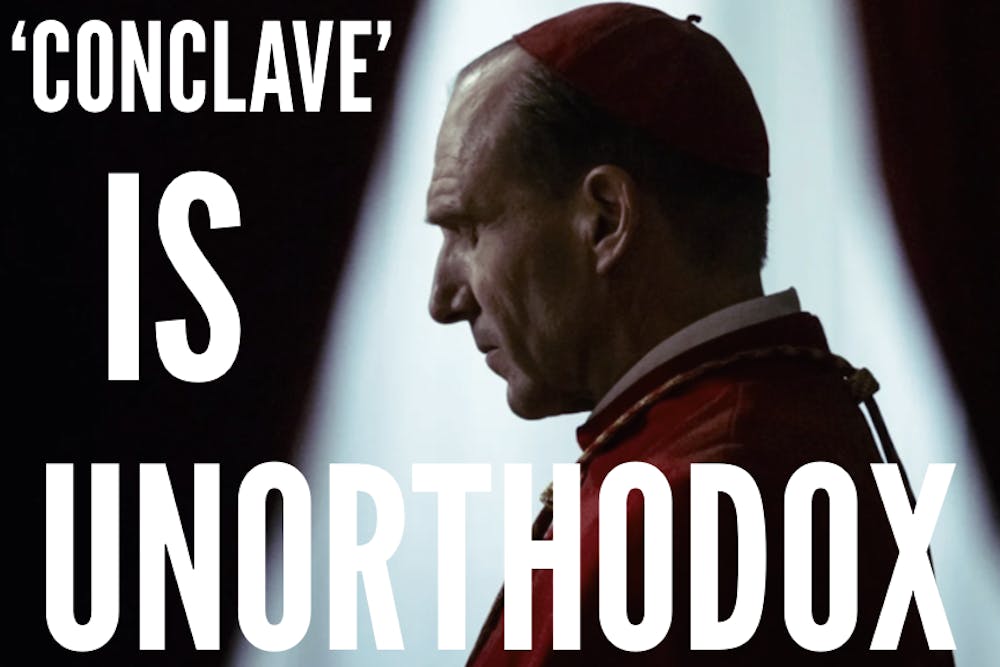Sing, oh Notre Dame movie critic, of the problem of Catholic filmmaking!
It’s a matter of balancing the scales. If you want to reach a non-Catholic audience, you have to avoid the saccharine-sweet sentimentalism of movies like “Father Stu,” but if you also want to reach the Catholic audience, you have to steer clear of the conspiratorial hysterics of movies like “The Da Vinci Code” — which is a hard temptation to resist, seeing as “The Da Vinci Code” sold tickets like hell. You’d also be wise to learn from what happened to Martin Scorsese and his “The Last Temptation of Christ” — i.e., avoid anything too artsy, lest you incur the wrath of a Mother Angelica–type.
It’s hard to make a good Catholic movie, you see; your options are limited. Rather than wrestle with these ideas, the ones really worth wrestling with, you should probably just save yourself the hassle and pitch a schlocky miniseries to a streaming service instead.
Few movies manage to navigate the aforementioned minefield unscathed enough to survive in pop culture while simultaneously maintaining enough of an artistic backbone to be a moving — rather than merely pleasant — watch. To my mind, the prototypical example of such a picture is “A Man for All Seasons.” As far as I can tell, it’s doctrinally inerrant. While this led the critic Pauline Kael to say of it, “There’s more than a little of the school pageant in the rhythm of the movie,” and while this statement is essentially true — structurally, the movie is a hagiography — most agree that it’s saved by good dialogue and good performances, including one from Pauline Kael’s own scene-stealing sweetheart Orson Welles.
Enter “Conclave,” a new drama film about a fictional papal election. As it began, I wasn’t sure whether to expect a variant of “Father Stu,” “The Da Vinci Code,” “The Last Temptation of Christ” or “A Man of All Seasons.” Happily, it was all its own.
“Conclave” was not an unconditional paean to the Catholic Church. It depicts clergy who sometimes fall prey to factionalism, simony and incontinence — as our clergy occasionally do. Nor was it a sensational jeremiad about the sins of the Vatican, however. The screenplay of “Conclave” leaves just as much room for pious and eloquent religious.
Overall, the writing is quite good. It certainly left me with more to think about than the straightforward parable of “A Man for All Seasons” did. I also enjoyed the acting, specifically Ralph Fiennes’s beautifully executed leading role (and I harbor a secret and irrational hope that Isabella Rossellini — who, if I’m not mistaken, is the only woman in the movie with any lines — will get a “Best Supporting Actress” Oscar nomination for her little role, Judi Dench in “Shakespeare in Love”–style). The rest of the cast (including Stanley Tucci and John Lithgow) handed in colorful, characterful performances as well. The cinematography and score are smart — a little over the top at points, but I liked it — and they reinforce all the other good choices director Edward Burger made. It’s a very atmospheric picture.
I think “Conclave” is a good reminder that making a good Catholic movie is 90% about making a good movie and only 10% about making a Catholic one. Had “Conclave” not been as tight a production as it was, I might not have been able to forgive its last 15 minutes — a chaotic ending which feels less like a twist and more like a random epilogue. You could remove it from the rest of the film, and the first 100 minutes of the picture would be pretty much unaffected. Still, the choice came from so far out of left field that I sort of admire the sheer bravado of it. Without saying too much and spoiling everything, let’s just say this would plotline would never get a “nihil obstat.” But it wasn't enough to ruin the “Conclave” for me — I want entertainment from movies, not coherent systematic theology. If you walking in to an AMC expecting the latter, you’re setting yourself up for failure.










